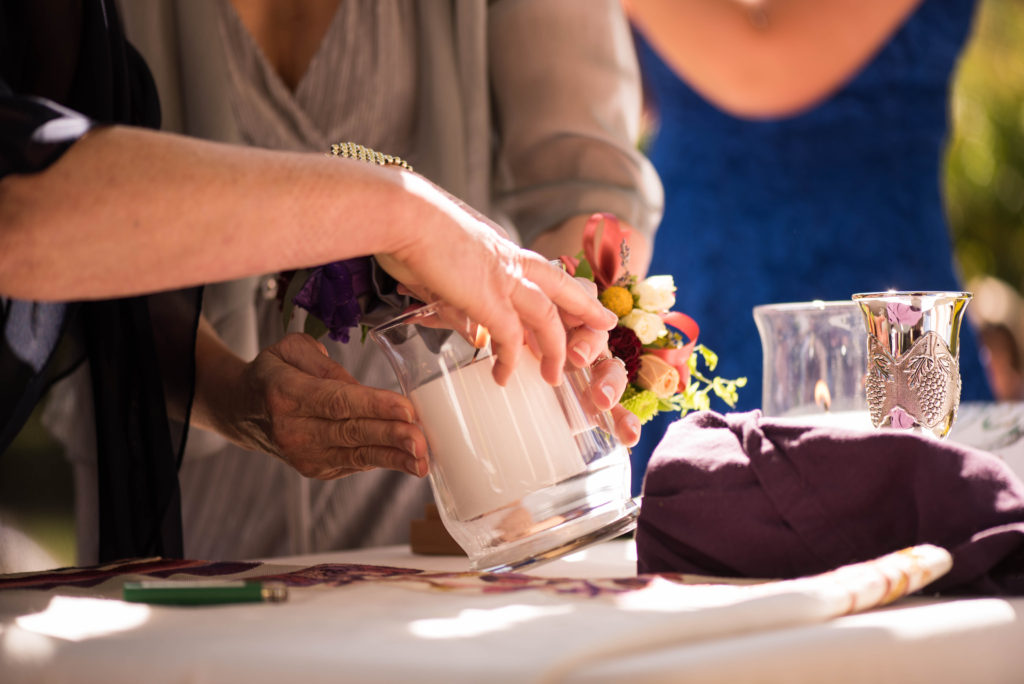
My mother and mother-in-law work together to light a candle at our Jewish wedding. I like this picture because it shows women working together to help us honor a tradition that me and my partner wanted to establish. Candles are also, of course, powerful symbols of remembrance.
I awakened yesterday morning to the news about the shootings at the Tree of Life synagogue in Pittsburgh. I felt mostly numb. Anti-semitism is not new. It is part of living life as a Jewish-American.
I still remember that Jewish synagogues in my hometown of Sacramento were fire-bombed when I was in middle school, undergoing Bat Mitzvah preparation. Three days after my Bat Mitzvah was 9/11, an attack not targeted towards Jewish people directly, but towards a Western way of life. But those moments back-to-back, of terror in all its forms, made me acutely aware that difference made you a target.
With that said, if you had asked me how I felt about being Jewish through high school and college, I would have told you that I was proud. Some of my fondest memories from my childhood were of my mom visiting my elementary school classrooms in December to make latkes on our portable fryer for my classmates, of my friends visiting my parents’ house to see what celebrating our holidays was like. Indeed, I liked honoring traditions that felt like uniquely part of my heritage. When I went off to college, I still visited hillel and I organized Passover seders with ingredients scrapped together from the dining halls in my dorm lounges. Another Jewish friend and I cobbled together a haggadah from anything we could find online and did what we could to recreate our family’s seders, to bring something to our non-Jewish friends that felt like it was uniquely ours. We received annual requests to organize Passover, and I felt a swelling of pride that we had helped other people understand the power of remembering a Jewish past (or they just really enjoyed our scrappy charoset made of swindled dining hall apples and handfuls of nuts from the breakfast oatmeal bar).
And yet as I’ve grown older, I can look back at those years and remember the small slights – the comments about my nose “looking Jewish” or my work ethic being “typically Jewish” – and think about all of the attempts to chip away at my own pride. Fortunately, they didn’t work. I maintain pride, even as I recognize the complexity of Judaism on a global scale, the challenges of the Israeli state, and the violence against Palestinians within Israel.
I’m writing to think about learning from hate. My posts on this blog tend to offer concrete solutions to conundrums in higher education and to understand what role technologies can play in responding to those problems. I’m not sure I can offer anything very concrete to that end today, for hatred and terror must be chipped away at slowly. We can’t adopt five quick tips for eliminating hatred from our public spaces (including our classrooms). I can’t share any cool new learning tools to start discussion about exclusion and terror, because no combination of tools can eliminate the deep cultural roots of hatred that so often undergird violent acts. But what I can do is offer a proposal to do what so many others have done before me: listen. Listen and learn.
I heard Krista Ratcliffe speak at UC Davis while I was a graduate student and remain stunned by her seemingly simple, yet still emotionally challenging proposal: to think of listening as a rhetorical act. Listening can be persuasive in a way that talking may not always be, and that listening can take many different forms. Eavesdropping is a very different form of listening, for example, than inviting someone into a conversation deliberately and inviting them to speak to help you learn from them. Both of these forms of listening have power, and you might listen in different ways to learn in different ways.
I want to be clear that listening does not mean NOT talking at all. On the contrary, we must speak up and out against hatred (part of my motivation for writing this post after trying to listen more myself). Some people, frankly, don’t deserve to be listened to if all they’re saying is clear, loud hate speech. But the more that we block off what we hear, the more that we show an unwillingness to learn from others, even those from whom we don’t think we have much to learn. Sometimes, we can’t know what’s possible to learn unless we listen, even if we know the things that we’re about to hear are going to be ugly. It takes a certain amount of privilege and strength to listen to ugly things and, frankly, any human can only take so much ugliness. So we have to be mindful and take care of ourselves in this process, of taking in what we can and when we can, and taking breaks to return to the tough work later.
One of the most powerful things we can do is learners is choose what we want to learn and how we want to engage. Good educators know that they need to give their students options for how to learn, even as they streamline or focus what content they want students to learn. Forcing everyone into learning in the same way at the same time is a good way to foment resentment. I think this same principle applies to listening to those with different perspectives and viewpoints than our own. We must choose who to listen to and how we do that listening. And we must do that in our own ways at our own times. But we must also be encouraged to do that work, pushed to do that hard work, since it’s not easy and it is demanding of our time and our energies, emotional and otherwise.
I wish I could offer a template for how to do this listening work well and how to give ourselves options to listen. But I don’t. Knowing when to listen, knowing who to listen to, and knowing how to listen to them is a set of skills that must emerge over time, from experience, from practice. I can’t say that I’ve mastered these skills myself yet and I am confident that I am often guilty of not listening to someone or of making hurtful assumptions about others. I often jump to defining others and their experiences in narrow terms because that narrow thinking makes it that much easier to know how to interact with and communicate with them. But I know that I need to do the hard work – along with everyone else – to avoid making quick judgments or assumptions as much as possible and to listen and to learn.
The work of learning from others, of combating hate, is lifelong work. There are days when the work of being in education feels fruitless, bogged down by bureaucratic constraints and slowed by the relentless meetings to approve of committees to approve of minor projects. But there are other days when the work of education feels pressing and urgent, when we can recognize that we do, in fact, have spaces designed precisely to expose ourselves to new things and new perspectives. It’s naive to say that all educational spaces – schools, training sessions, online courses – can function this way, but I remain drawn to educational work in large part because there still remains the potential to do this tough work, to start conversations in spaces designed for challenging ourselves.

Thank you for your heartfelt words and wisdom ♥️
Thank you for this comment, Lisa! Glad this post resonated with you. 🙂